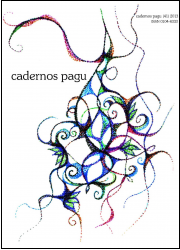Resumo
Coisas que sabemos. O primeiro volume da História da Sexualidade de Michel Foucault termina com uma discussão de três formações de poder que ele acreditava que definiam a história do poder (liberal) moderno – soberania, disciplina e biopoder. Conforme Foucault, os dois últimos poderes nos permitem “entender a importância adquirida pelo sexo como uma questão política”, na medida em que “sexo era tanto um acesso à vida do corpo quanto à vida da espécie” (Foucault, 1978:145, 146)Referências
BUTLER, Judith. Performativity, Precarity and Sexual Politics. Revista de Antropologia Uberoamericana 4 (3), 2009.
DERRIDA, Jacques. The ends of Man. Philosophy and Phenomenological Research 30 (1), 1969.
FOUCAULT, Michel. The History of Sexuality, An Introduction. Vintage, 1978. [Tradução: Robert Hurley].
__________. Security. Territory, Population: Lectures at the Collège de France 1977-1978. Picador, 2009.
LACLAU, Ernesto. On Populist Reason. Verso, 2005.
MBEMBE, Achille. Necropolitics. Public Culture 15 (1), 2003.
POVINELLI, Elizabeth. Empire of love: toward a theory of intimacy, genealogy and carnality. Durham, Duke, 2006.
POVINELLI, Elizabeth. The Crisis of Culture and the Arts of Care. In: ALTMAN, Jon e HINKSON, Melinda (eds.) Culture Crisis –Anthropology and Politics in Aboriginal Australia. University of New South Wales Press, 2010.
POVINELLI, Elizabeth. Economies of abandonment: social belonging and endurance in late liberalism. Durham, Duke, 2011.
STOLER, Ann. Race and the Education of Desire: Foucault’s History of Sexualirty and the Colonial Order of Things. Duke, 1995.

